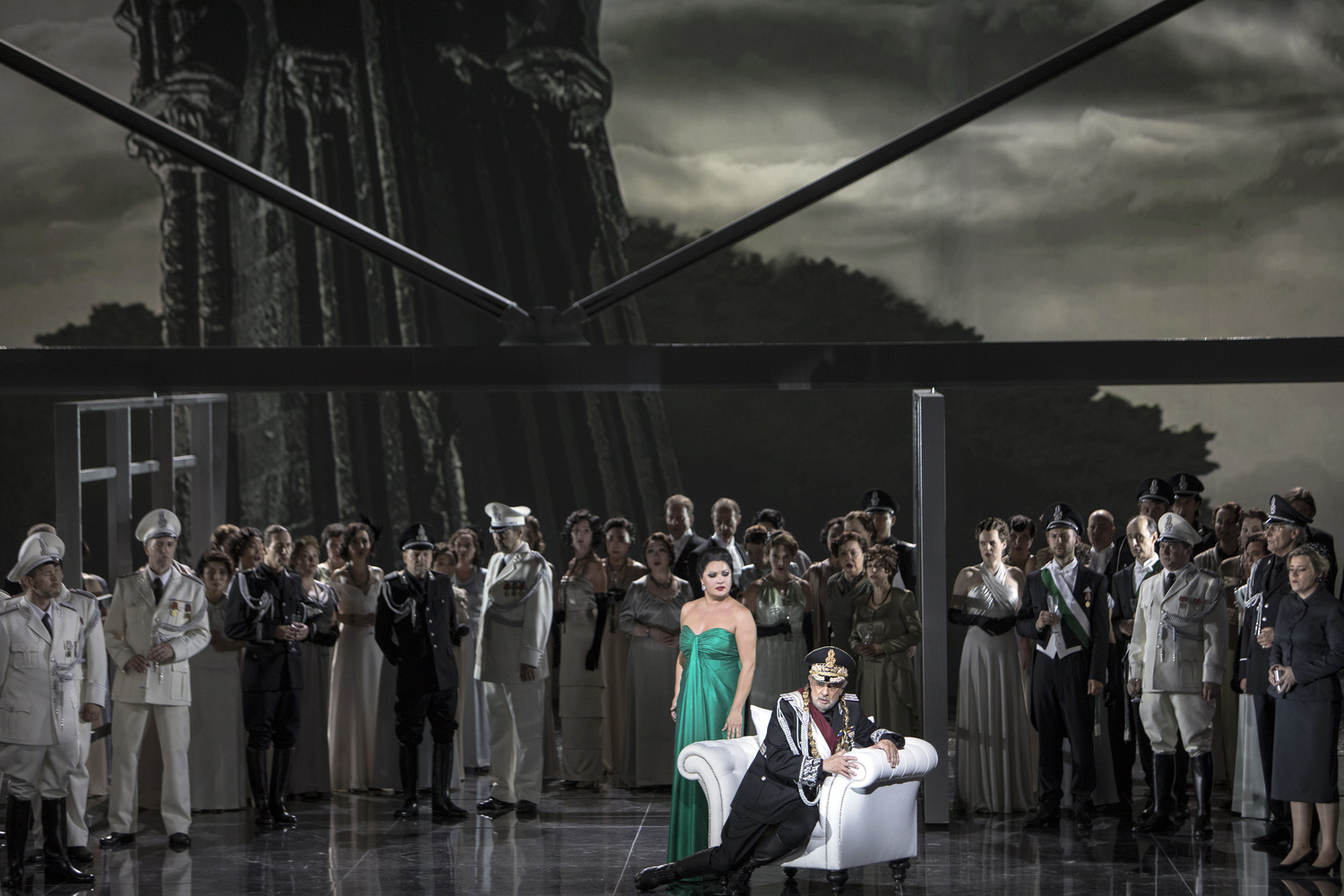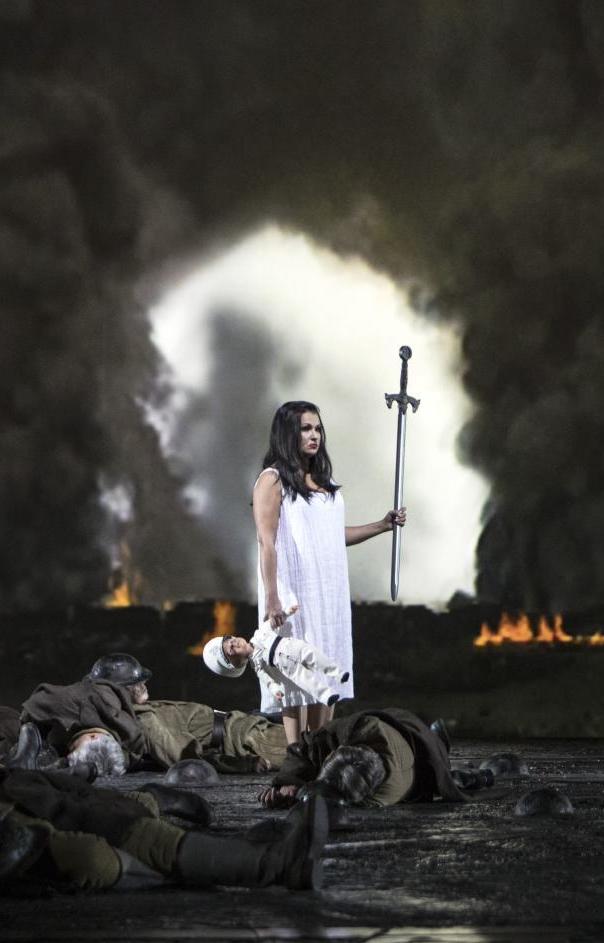Review: MACBETH at STAATSOPER UNTER DEN LINDEN - Superstars Netrebko and Domingo miscast in a glittering new production of Verdi's MACBETH
 Currently, the world of opera is sorely lacking superstar talent. Last night, at the Staatsoper unter den Linden, three of the world's brightest classical-music talents came together in a very expensive, glittering new production of Verdi's MACBETH.
Currently, the world of opera is sorely lacking superstar talent. Last night, at the Staatsoper unter den Linden, three of the world's brightest classical-music talents came together in a very expensive, glittering new production of Verdi's MACBETH.
Anna Netrebko, Placido Domingo and conductor Daniel Barenboim, the Staatsoper's Music Director, were the "above the title" names in the production. Of the three, only Barenboim, now 75, truly fulfilled his role in the production. He led the marvelous Staatsoper Orchestra in a tightly controlled, excellent performance of this early Verdi opera. Where drama was sorely lacking onstage, Mr. Barenboim found every nuance and color in Verdi's orchestration and brought it to the fore. In deference to the "unusual" casting of both Macbeth and Lady Macbeth, the orchestra was unusually subdued in many passages, to accommodate the talents of the singers at hand.
Mr. Domingo, now 77 years old, is a marvel of vocal longevity. Upon his first entrance, one is astounded at the clarity and brilliance of his voice. His intonation, vibrato, and resonance are still pristine. The baritonal quality of his sound has remained unchanged and his musicality and phrasing have only improved with age. Frankly, he sounds very similar to his "glory years" as one of the world's "Three Tenors." Therein, lies the rub. .jpg)
Mr. Domingo's decades of service to opera have won him legions of fans worldwide, who will pay to hear Mr. Domingo sing practically anything. Musically, however, he now does no service either to Maestro Verdi's or his own reputation. Regardless of the baritonal quality of his voice, Mr. Domingo was, and remains, a tenor. Macbeth was written for a baritone. The tessitura of the role sits at least a third too low for him, and the majority of Macbeth's singing is in the weaker part of Mr. Domingo's tenor voice. Where he should dominate the stage and the ensembles, Mr. Domingo's singing is only a part of the musical tapestry. It is a functional performance, nothing more. Were he not "Placido Domingo," no critic would spend a moment remarking on his Macbeth. As marvelous as it is to have this great artist onstage, and no matter how beautifully and intelligently sung Mr. Domingo's performance is, he should not be singing Macbeth, or any baritone role, for that matter.
As to Anna Netrebko's Lady Macbeth, one is confronted with a once-great lyric soprano that has been artificially darkened and manipulated to the point of being nearly unrecognizable. Occasionally, in some of the sotto voce passages, one hears a glimmer of the "Anna Netrebko" sound that made her a star. Unfortunately, these moments are few and far between in MACBETH.
 Never a great coloratura singer, through her darkened vocals, her attempts at Lady Macbeth's vocal runs were cursory and laughably sloppy. As she thickens her middle and lower registers, she is losing both the brilliance and volume of her top notes. As soon as she adds any weight to her sound, which she does constantly in MACBETH, her diction flies completely out the window. Often, one has no idea what language she is singing. It's a hooty, dark brew of unintelligible vowels and sloppy consonants. In order to darken her sound, she is manually manipulating her mouth and lower jaw, which is extremely distracting from her performance. She has weighted her voice to sing a repertoire that she has no business singing. It is only a matter of time before Ms. Netrebko's voice will fall victim to her ambition and stop functioning.
Never a great coloratura singer, through her darkened vocals, her attempts at Lady Macbeth's vocal runs were cursory and laughably sloppy. As she thickens her middle and lower registers, she is losing both the brilliance and volume of her top notes. As soon as she adds any weight to her sound, which she does constantly in MACBETH, her diction flies completely out the window. Often, one has no idea what language she is singing. It's a hooty, dark brew of unintelligible vowels and sloppy consonants. In order to darken her sound, she is manually manipulating her mouth and lower jaw, which is extremely distracting from her performance. She has weighted her voice to sing a repertoire that she has no business singing. It is only a matter of time before Ms. Netrebko's voice will fall victim to her ambition and stop functioning.
With star performers of this caliber, the Staatsoper spared no expense on the production design. The set by Hans Schavernoch, and especially the video projections of Thomas Reimer, were both gorgeous and very effective. Director Harry Kupfer and Costume Designer Yan Tax have moved the action to an undefined decade in the early 20th century. There are lots of epaulets, military uniforms, and refugees, none of which really add anything to Mr. Kupfer's very traditional "stand and sing" direction.
MACBETH was the 10th of Verdi's 37 operas. In contrast to his later works, where lyric and melody better served the dramatic impulse of the story, MACBETH often suffers from happy "oom pah pah" melodies underneath tragic lyrics. He had not yet mastered the art of dramatic orchestration and melodic construction at this point in his career. As such, MACBETH, while admirable, does not achieve the emotional connection with its audience of other Verdi masterpieces. It has never attained the critical or audience popularity of "La Traviata," or "Aida." Additionally, MACBETH is very difficult to cast. The role of Lady Macbeth is a dramatic soprano role with an extreme vocal range that still demands tremendous vocal agility. The title role needs a baritone of great power and emotional expressiveness who also possesses great dramatic skills. As witnessed last night at the Staatsoper unter den Linden, this production is still in need of its main cast.
ALL PHOTOS: COPYRIGHT BERND UHLIG. REPRODUCED WITH PERMISSION.
Reader Reviews

Videos

